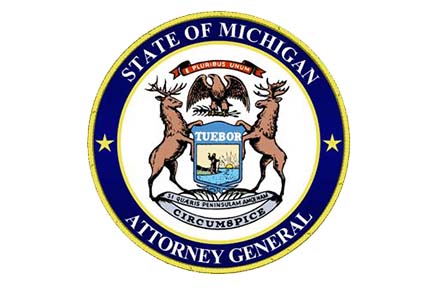
Alert on Disaster Relief and Charity Scams
|
|

|
|

|
|


FOR IMMEDIATE RELEASE January 15, 2025 Contact: [email protected]
Governor Whitmer Delivers Road Ahead Address, Laying Out Commonsense, Bipartisan Vision to Grow the Economy and Save Michigan’s Auto Industry Address highlights top economic priorities for the Whitmer-Gilchrist administration, including saving Michigan’s auto industry and negotiating a bipartisan roads deal
LANSING, Mich. – Today, Governor Gretchen Whitmer delivered her “Road Ahead Address” at the Detroit Auto Show where she outlined her administration’s approach to saving Michigan’s auto industry and growing our economy by creating good-paying jobs, fixing the damn roads, and building relationships with our neighbors. Each of these priorities builds on the historic work the Whitmer-Gilchrist administration has accomplished over the past six years, ensuring Michigan is the ideal place for people and businesses to locate, invest, and grow.
“To grow Michigan’s economy and fight for the auto industry, I’ll work with anyone who’s serious about solving problems in Lansing or DC,” said Governor Whitmer. “Right now, there’s an ongoing, global competition between Michigan, China, and other states to build the future of the auto industry. To make sure we win, we need commonsense, bipartisan tools that create good-paying jobs and bring supply chains home. We must also find a fiscally responsible, sustainable solution to fix the damn roads work with our Canadian neighbors to ensure tariffs don’t lead to higher costs for families and businesses. Together, let’s create Michigan jobs, fix Michigan roads, and grow Michigan’s economy. The road ahead is bright, so let’s roll up our sleeves and get to work.”
“Michigan’s auto industry has been a beacon of hope and opportunity for millions of families, including my own,” said Lieutenant Governor Garlin Gilchrist II. “Today, Governor Whitmer’s ‘Road Ahead Address’ affirms our administration’s commitment to making sure we define its future. Alongside the legislature, we can and must strive to grow our economy, unleash cutting-edge innovation, and win transformative investments to ensure Michigan remains the best place to build the future. Let us keep standing tall so that future generations of Michiganders can enjoy a stronger, more prosperous state.”
Creating Jobs and Lowering Costs Growing Michigan’s economy by bringing good-paying jobs home and putting money back in Michiganders’ pockets has remained a top priority of the Whitmer-Gilchrist administration since day one. As such, during her “Road Ahead Address,” Governor Whitmer laid out her vision to continue stimulating economic development in Michigan through five specific goals:
Fixing the Damn Roads Since taking office, Governor Whitmer has invested over $19 billion in Michigan’s roads and bridges as part of her Rebuilding Michigan bond plan, helping to fix more than 23,000 lane miles of road and 1,600 bridges, supporting over 118,000 jobs. However, this plan ends in 2025, requiring a long-term solution to continue fixing the damn roads, ensuring Michiganders and companies can depend on reliable infrastructure in our state.
In her “Road Ahead Address,” Governor Whitmer made it clear that she will work with anyone to find a solution to road funding, calling on the Michigan legislature to set aside their differences and negotiate a bipartisan roads deal in 2025. Specifically, she highlighted the importance of compromise and bipartisanship, appealing to both sides of the aisle to find new and fair sources of revenue as well as explore fiscally responsible cuts, ensuring Michigan can keep repairing and rebuilding our roads. Future of Michigan-Canada Relationship Detroit-Windsor is the busiest active border crossing in North America, driving more than a quarter of the $700 billion of annual trade between the U.S. and Canada. Since taking office Governor Whitmer has cultivated a relationship with our Canadian neighbors through agreements on cross-border electric vehicle testing, supply chains, trade, and job creation. Over the last few years, Canadian businesses have announced 26 projects in Michigan, creating over 4,000 jobs.
During her “Road Ahead Address,” she announced that she met with Ontario Premier Doug Ford last month, affirming Michigan’s relationship with Ontario. This vital partnership will help ensure the health of Michigan’s auto industry, protecting Michigan jobs and keeping costs low for people across the state.
Approach to Trump-Proposed Tariffs Governor Whitmer also stated her position on the incoming Trump administration’s proposed tariffs. Governor Whitmer believes in a judicious approach that will protect supply chains and job creation here in Michigan.
70% of all auto parts made in Michigan go to our neighbors. If the Trump-proposed tariffs were enacted as a one-size-fits-all policy, every time a Michigan auto part crosses a border and gets taxed, those costs will be passed on to Michiganders at the dealership. Crippling Michigan’s auto ecosystem will only help our biggest competitor: China. Governor Whitmer has made it clear that she is committed to working with our neighbors to the North to protect Michigan’s auto industry. That’s why the Whitmer-Gilchrist administration has been in active discussions with Canadian officials to explore ways we can collaborate on tariffs, lower the cost of doing business, and protect Michigan industry and consumers.
Delivering for Michiganders Since 2018 Since taking office, the Whitmer-Gilchrist administration has continued to deliver on the kitchen-table issues that matter to Michiganders. Over the past six years, Governor Whitmer has signed more than 1,400 bipartisan bills and 6 balanced budgets; nearly 1,000 of those bills were signed under a Republican legislature.
Other accomplishments include:
|

Pontiac, Mich. – In an effort to protect the health of its residents, Oakland County Health Division is now providing free radon test kits to residents year-round, thanks to the support of the Board of Commissioners. These kits, previously discounted during National Radon Action Month in January, can be picked up at Health Division offices in Pontiac and Southfield, Monday through Friday, from 8:30 a.m. to 5 p.m.
Radon, a naturally occurring, invisible and odorless gas, is the leading cause of lung cancer in non-smokers and the second leading cause of lung cancer overall. It has been found at elevated levels in all 83 Michigan counties, with one in four Michigan homes testing high for radon. The only way to detect this hazardous gas is through testing, as it can enter homes through small cracks in the foundation and accumulate indoors.
“We are committed to ensuring the health and safety of our community by making it easier for residents to test their homes for radon,” said Oakland County Executive Dave Coulter. “Testing is crucial, especially during the winter months when windows and doors are closed, allowing radon levels to rise.”
The Health Division recommends testing your home for radon every two years. If high radon levels are detected, residents are encouraged to contact Environmental Health Services for guidance on mitigation. For more information, visit oakgov.com/radon or call 248-858-1312 in Pontiac or 248-424-7191 in Southfield.

|
|

|
|